#feanor and indis
Text
Imagine if Fëanor and Indis actually got along really well.
I know that most people perceive that he hated her because she 'replaced' Míriel, but just imagine that they somehow managed to talk everything out and then get along and maybe even become friends.
But they still make a joke of pretending to hate each other when other people are around. And in private they make up insults to throw at each other when they're at the next family party, out of fun.
However, they make the insults so absurd that they make the others laugh. The two try to heal their somewhat broken family with that.
I think Finarfin would notice it first. But Fingolfin would also realize it, because Fëanor started to call him 'little brother' instead of all the 'nice' nicknames that he had normally for him.
▪︎ ▪︎ ▪︎
Finwë: Can you two at least pretend to get along?
Fëanor & Indis, who pretend to not get along: ...
138 notes
·
View notes
Text
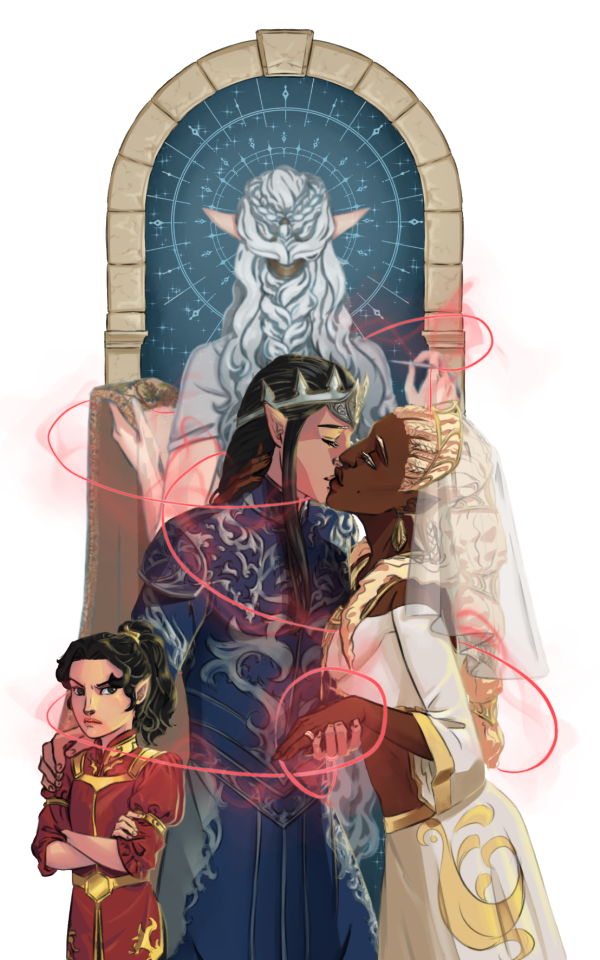
Marriage of Finwë
...and the thread of destiny is spun ever on.
aka Fëanaro is not impressed :) Not-so-transparent ghost Miriel under the cut

#my art#feanor#finwe#house of finwe#indis#tolkien#silmarillion#miriel#Míriel Þerindë#tapestry of time#this took me an embarrassing long time#but hey at least I have now a Finwe and an Indis design#weeeh
702 notes
·
View notes
Text
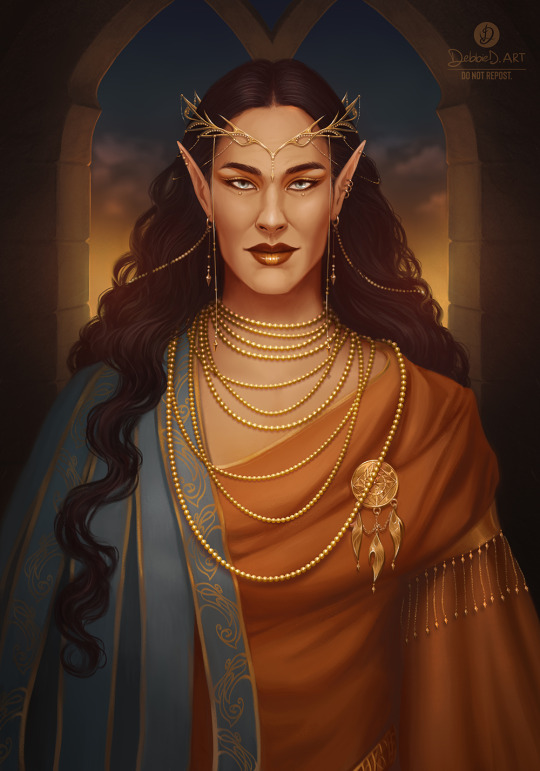
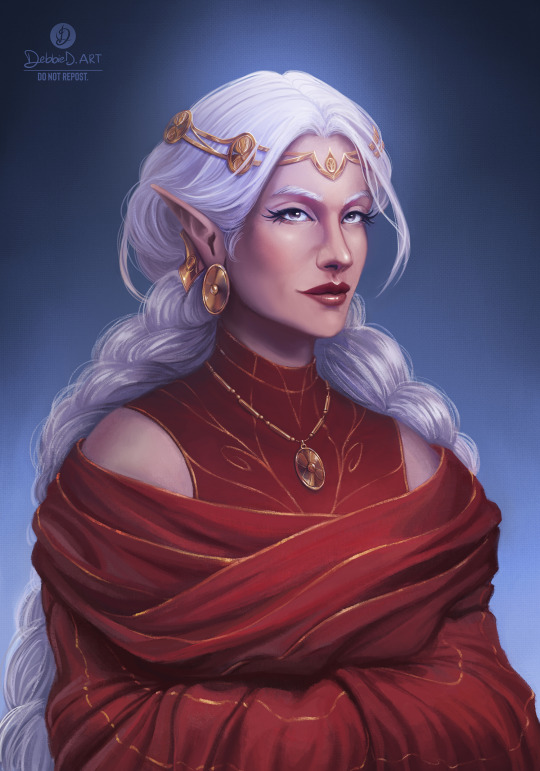

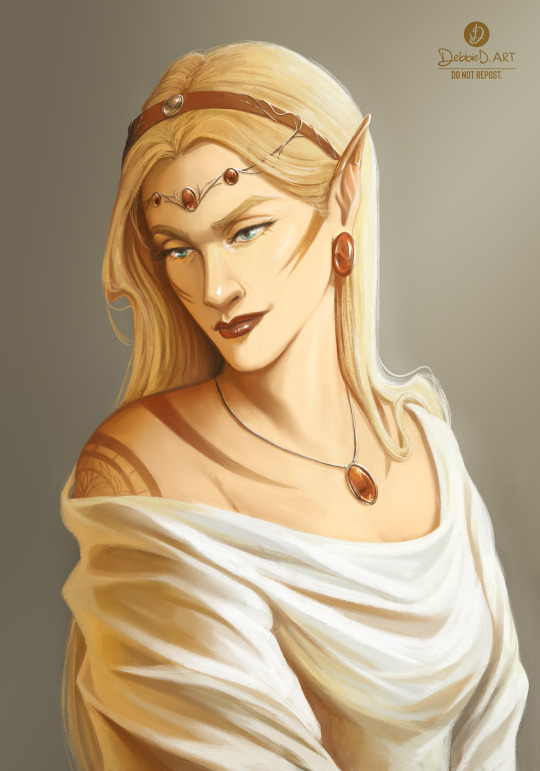

House of Finwë ~
Finwë - Miriel - Indis - Findis - Lalwen
// prints!
fëanorians: 1 - 2 - 3
nolofinwëans: 1 - 2 - 3
arafinwëans: 1 - 2 - 3
#finwe#miriel#indis#findis#lalwen#irime#feanor#fingolfin#finarfin#noldor#elves#tolkien#silm#silm fanart#silmarillion#lotr#lord of the rings#portraits#digital art#middle earth#jrr tolkien#silm art
285 notes
·
View notes
Text

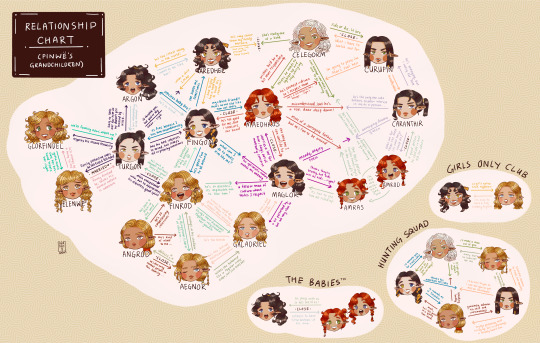
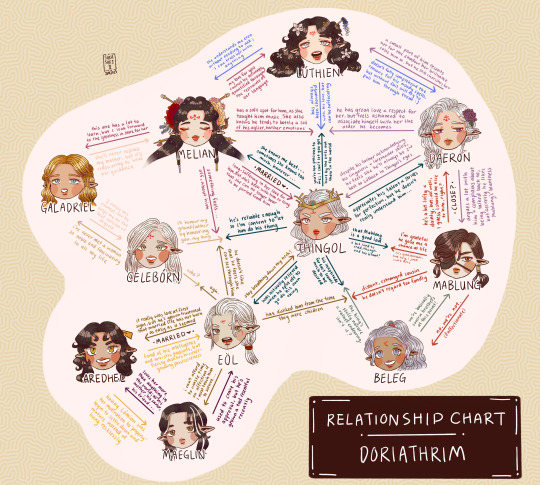
was real busy this week so no time to draw, but i had some little chibi heads lying around that i didnt have a real use for so i wanted to try my hand at some character relationship charts 😌 i used to really love reading them when they would be compiled for old jrpg or visual novel games i was into, so i thought it'd be fun to explore some finwean dynamics i personally tend to lean on in my fics n comic wooo
#silmarillion#house of finwe#maedhros#feanor#feanorians#silm#i stand by indis miriel friendship solidarity#daeron gets angstier everytime i go back to him#i cant stop thinking of his dynamic with mablung and beleg nowadays... bodyguard and sheltered prince? maybe...?#this is very self-indulgent im very sorry 🙇♀️#i find it really fun to read character relationship charts but i dont know where to find most of em on google anymore...#maglor#noldor#finwe#fingolfin#fingon#sons of feanor#nolofinweans#finarfin#finrod#galadriel#aredhel#maeglin#celegorm#curufin#caranthir#nerdanel#daeron#melian#glorfindel
681 notes
·
View notes
Text

Indis is about to steal his girl
909 notes
·
View notes
Text
Please read this Morgoth's Ring quote with me cuz this is PEAK Fëanor and Fingolfin angst potential:
[[This is Finwë talking to the Valar about Indis]] "But Indis parted from me without death. I had not seen her for many years, and when the Marrer smote me I was alone. She hath dear children to comfort her, and her love, I deem, is now most for Ingoldo. His father she may miss; but not the father of Fëanáro!"
Those familiar with only the Shibboleth's list of quenya names might assume that this is referencing Finarfin, but no. At this point in the story, Ingoldo was Fingolfin's mother-name. This quote implies that, according to Finwë's observations, Fingolfin was Indis's favorite child.
SO IMAGINE; Fëanor, who loves his mother so dearly and so desperately, but never knew her, and therefore never felt her love in return, looking at Fingolfin, who gets the favoritism and motherly love that he craves yet never got. Imagine how jealous and furious that might make him, especially since he hates Indis so much. I can't help but wonder if Fingolfin's being his mother's pride and joy was one of the reasons why Fëanor seemed to hate him the most of his half-siblings.
333 notes
·
View notes
Text
Anaire: “So how’s life with a baby?”
Nerdanel: “Exhausting. I didn't know that it was possible for someone to cry this much.”
Indis: “Oh, I’m sure he’ll grow out of it soon.”
Nerdanel: “Oh no, no, no, no. The baby’s an angel, he’s no trouble at all.”
Earwen: “...But you just said-?”
Feanor, holding baby Maitimo and crying: “Nerdanel, I love him so much!”
374 notes
·
View notes
Text

My drawing for @silmarillionepistolary day 4, Friendship and Alliance!
It has been a long time since Finwë drew anything … it didn’t feel right without his muse. Besides, he has been too busy raising his soon, Fëanáro, whose tumultuous temperament lives up to his name - though, despite being still very young, he has shown great intelligence and creativity.
Finwë’s duties as High King of the Noldor have also filled up his time, but it has also opened up so many opportunities for learning more about the world and people around him.
On the top left is Círdan, a Telerin mariner and good friend of Finwë’s. Though his people came to Valinor later, Finwë was the first to welcome them - and since then the Noldor and the Teleri have been friends. The Teleri’s beaches are rich with jewels and pearls which they gladly trade with the Noldor.
What really inspired him to draw again is the Vanyar princess, Indis, a gentle and outgoing woman with hair like spun gold. Finwë tries to avoid her - and the feelings for her that have gradually been growing in him - but there is something in her smile that makes him want to smile too, in the way that only his late wife could before.
#art#my art#the silmarillion#finwe's sketchbook#finwe#Indis#círdan#feanor#silmarillion epistolary#fandom event
86 notes
·
View notes
Text
Conditions sound ripe for every single one of Finwë's children and grandchildren to have a complex about never being enough and needing to prove their right to exist.
"...many saw the effect of this breach within the house of Finwë, judging that if Finwë had endured his loss and been content with the fathering of his mighty son, the courses of Fëanor would have been otherwise, and great evil might have been prevented...But the children of Indis were great and glorious and their children also; and if they had not lived the history of the Elder would have been diminished" (Ch 6, The Silmarillion).
Yes, this sounds like the narrator's justification of Indis' marriage and her descendants' right to freaking exist but it is justified on account of their actions, not their personhood.
With this quote it's most obviously Indis' descendants, but this applies to Feanor too: feeling like he has to be the best and the greatest to make up for "causing" his mother's death.
If such a view was prevalent--what if they all felt like they had something to prove; what if they all felt like they needed to make their mark on the world to prove that they had a right to exist?
What if they all believed that they had to do something great, something more epic than anyone could've imagined, to make their existence worthwhile, to balance out the damage that their existence created?
213 notes
·
View notes
Text
concept i've been thinking about lately: feanor writes all his notes in conlangs. so no one else can understand them, of course. except sometimes, he can't understand them either. this is the real reason why the silmarils were a one time thing.
#imagine: ñolo tries to sneak into feanaro's office and get his notes to figure out what hes working on and he just#cant understand any of it#iconic#tell me feanor wouldnt do his#and he would keep a journal where he talked shit about his brothers and indis also in conlangs#and eventually ñolo finds the key/notes for one of them and learns it#and just casually greets 'naro in it one day#and feanor's just like 👁️👄👁️#i love them your honor#feanor#feanaro#sons of finwe#nolofinwe#arafinwe#fingolfin#finarfin#indis#miriel#finwe#silm#silmarillion#tolkien#valinor#silmarils
251 notes
·
View notes
Text
These are now the valinor tree era born elven eyes and i will be taking no notes:

(Yes, this is my art)
Hc that the light of the trees that shine in their eyes illuminates colors that others don’t even know are there.
#lord of the rings#lotr#silmarillion#lotr elves#the hobbit#galadriel#feanor#fingolfin#finarfin#sons of feanor#nolofinweons#arafinweons#vanyar#noldor#teleri#ingweons#indis#light of the trees#silvantransthranduiltrash fanart
101 notes
·
View notes
Text
Love in Arda
For Valentines day I have multiple cute shipping quotes for you!
Finwe, rushing into the council room: Greetings, sorry I’m late. I was doing a couple of things and got distracted.
Miriel, casually walking in after him: I’m “a couple of things”.
Indis, following her, grinning: I’m “got distracted”.
Nerdanel, nervously: Okay, but what if we went to dinner not as friends this time?
Feanor, hesitently pulling out his sword: AS ENEMIES?!
Nerdanel: ...
Melkor: We’re getting married, bitches!
Mairon: And we're about to make it everybody else's problem.
Rog: I don't need to go to bed. I'm not tired, I'll be fine.
Salgant: But, darling, I'll be so lonely without you. Come curl up in my arms so I can feel whole again.
Rog: O-oh. Well. Are you trying to seduce me into healthy sleeping patterns??
Salgant: Is it working?
Melkor: Hey, what’s up?
Manwe, lying in the grass, watching birds: The sky. The eagles.
Melkor, rolling his eyes: No, I meant like, what are you doing?
Manwe, innocently: Oh, Varda.
Varda, over Melkors crying: *highfives Manwe* Nice!
#lotr#silmarillion#silmarillion memes#incorrect silmarillion quotes#silmarillion ships#melkor#morgoth#manwe#varda#mawe x varda#hammer of harp#rog#salgant#rog x salgant#mairon#sauron#angbang#feanor#nerdanel#feanor x nerdanel#finwe x miriel x indis#finwe#miriel therinde#indis#indis x finwe x miriel#miriel x indis x finwe#valentines day
91 notes
·
View notes
Text
I think one of my favorite Silmarillion fandom tropes is "Arda Remade is fucked up actually."
Because who gets to decide what a perfect world looks like? Is that even possible? Most of the work I've seen about Arda Remade explores what would happen if the Valar made those choices, and perhaps, chose wrong.
If Miriel never dies, Finwe never remarries, and his other children never exist. If the latter bond takes precedent, and Finwe marries Indis first, what about Feanor? After all, even if Miriel, Finwe, and Indis would be happy with some sort of poly situation (good for them), there's no guarantee that whoever remakes the world would see it that way.
If a perfect world means the elves never leave Valinor, what happens to elves born from unions between exiled Noldor and elves in Middle-Earth? What happens to the half-elves? Is there no need for Earendil, in a world with no Morgoth to fight against? No need for Elrond in a world that shouldn't need healing?
Does anyone even know what's missing? What choices have been made for them? There's just so much tragic potential there.
Anyway, you should go read We Dream of Truth by Drag0nst0rm because it's a beautiful story about the imperfections of Arda Remade.
#silmarillion#arda remade#dagor dagorath#elrond#elrond peredhel#miriel#indis#finwe#feanor#earendil#fic rec
56 notes
·
View notes
Text
As noted, I have never bought into the “Finwe and Indis condemned Miriel to eternal death” take on their situation or other views that Finwe and Indis callously fucked Miriel (and/or Feanor) over, partly because it does not, to my eye, comport to how the situation is presented, where the narrative does not place blame on any one of the three of them. The choice to remain in Mandos very much belonged to Miriel, and it was a decision she made repeatedly and without hesitation or wavering. That she might have, many years later, come to regret it does not mean Finwe and Indis were necessarily wrong to rely on the choice Miriel had repeatedly made clear. Neither is Miriel someone malleable and prone to being coerced or manipulated--she, like her son, is firm of mind and unwilling to be swayed by others. And indeed it wasn’t until after Finwe’s death that she did begin to change her mind, at which point Finwe willingly remains in Mandos so that Miriel can accept rebirth.
Even if you don’t accept History of Middle-earth as canon (and no one is required to), I think it can be very indicative of the intent behind The Silmarillion, so I have included some of those quotes below also, because Morgoth’s Ring addresses a few versions of Finwe and Miriel’s story.
“At their parting (for a little while as he thought) Finwë was sad, for it seemed an unhappy chance that the mother should depart and miss the beginning at least of the childhood days of her son.” (The Silmarillion, “Of Fëanor and the Unchaining of Melkor”)
Initially, Miriel’s time in Lorien was meant to be temporary and restorative, and Finwe treats it as such, anticipating Miriel’s eventual return. Each version of this story makes it clear that what Finwe wanted above all was not to remarry, but to be reunited with Miriel, and that he was willing to wait for her to return--but not if she persisted in having no plans to ever return.
“Then [after Míriel’s passing] Finwë lived in sorrow; and he went often to the gardens of Lorien, and sitting beneath the silver willows beside the body of his wife he called her by her names. But it was unavailing; and alone in all the Blessed Realm he was deprived of joy.” (The Silmarillion, “Of Fëanor”)
Some of the Valar speak of Finwe’s impatience, but their perspective is much different than that of the Children. Finwe does not immediately give up on Miriel; they speak of her healing in Lorien and Finwe persists in believing that she will return, even after her effective death. In “Of the Silmarils and the Darkening of Valinor--Of Finwe and Miriel” from Morgoth’s Ring, it was twelve years after Miriel’s death that Finwe first approached Manwe about remarriage--a fair chunk of Feanor’s childhood.
“Now Ingwë, hearing of the strange grief of Finwë, and desiring to lift up his heart and withdraw him from vain mourning in Lorien, had sent messages bidding him to leave Túna for a while, and to come and well for a season in the full light of the Trees. Finwë thanked him but did not go, while there was yet hope that Míriel would return.” (Morgoth’s Ring, “Of the Silmarils and the Darkening of Valinor--Of Finwë and Míriel”)
It really isn’t until after the passing of the Statute of Finwe and Miriel, when Miriel commits to remaining in Mandos, that Finwe surrenders the hope that she will return and they will be together again.
Even after the statute is passed and Manwe gives Finwe permission to consider remarriage, Finwe still expresses a preference for Miriel’s return rather than remarriage:
“Finwe answered: ‘I am in no haste, My Lord, and my heart has no desire, save the hope that when this doom is made clear to Míriel, she may yet relent and set a term to my bereavement.’“ (Morgoth’s Ring, “Of Finwë and Míriel”)
Certainly you can argue he is focused here on his own feelings--but generously I would suggest it’s not entirely fair to give Miriel the power to choose not return to life but also to prevent her husband from ever moving on. Finwe is and has been willing to wait for Miriel--what appears to frustrate him is that he sees no sign Miriel will ever change her mind and therefore that he will be expected to dwell forever in perpetual grief. Which is, you know. Not great for anyone.
Vaire relays this sentiment to Miriel, who insists she cannot be healed within Arda, and Vaire reports to Namo on her mindset:
“Then Vairë said to Mandos: ‘The spirit of Míriel hath dwelt with me, and I know it. It is small, but it is strong and obdurate: one of those who having said this will I do make their words a law irrevocable unto themselves. Unless constrained, she will not return to life or to Finwë, though he should wait until the ageing of the world.’“ (Morgoth’s Ring, “Of Finwë and Míriel”)
Further confirmation that Miriel’s mind cannot be swayed by counsel (hmm that sound familiar...). Having made her decision, she means to stick with it, no matter how long Finwe waits for her. Asking Finwe--the only widower in Aman--to simply accept never having a partner again is also a heavy price to pay, and for a decision that wasn’t his.
“‘Therefore the one that is in the keeping of Mandos shall remain there until the end of Arda, and shall not awake again or take bodily form. For none among the Quendi shall have two spouses at one time alive and awake...this disunion shall come to pass only with the consent of both. And after the giving of the consent ten years of the Valar shall pass ere Mandos confirms it. Within that time either party may revoke this consent...’
It is said that Míriel answered Mandos saying: ‘I came hither to escape from the body, and I do not desire ever to return to it.’ (Morgoth’s Ring, “The Earliest Version of the Story of Finwë and Míriel”)
This earliest version of the story presents one where Miriel had a decade at minimum to choose to revoke her decision to remain in Mandos and that she herself could have put the nix on the possibility of Finwe’s remarriage, but chose not to do so. In later drafts of the story, the time required to pass before consent is accepted is increased to twelve years. (If you combine this with the twelve years Finwe waits to even approach Manwe about remarriage, this is a total of at least twenty-four years between Miriel’s death and even the possibility of Finwe’s remarriage. Add to this the three years that certain drafts place between this and his marriage with Indis for a potential total of twenty-seven years between Miriel’s death and Finwe’s remarriage.)
Here, Miriel is expressly, clearly, directly informed that she may choose to remain in Mandos, but that if she permits Finwe’s remarriage and he takes it, she will lose the ability to choose rebirth. Still, Miriel sticks with her original decision. With informed consent, Miriel makes her choice. Unless we are meant to assume she doesn’t know what she wants, it’s hard to take this as anything but confirmation that Miriel is sure she will never want to return to life. It seems unfair to condemn Finwe and Indis for taking her at her word, even if she eventually comes to regret her choice. (This is the price of the freedom of choice--you may make a choice you regret.)
“But the shadow of Míriel did not depart from the house of Finwë, nor from his [Finwë’s] heart; and of all whom he loved Fëanor had ever the chief share of his thought.” (The Silmarillion, “Of Feanor”)
Even after his wedding to Indis, Finwe does not forget his love for Miriel, and he certainly doesn’t show favoritism to the children of Indis--rather, he seems particularly concerned that Feanor should know he is loved despite his father’s remarriage. That Feanor refuses to accept this cannot, I think, be laid wholly at the feet of Finwe, particularly into Feanor’s adulthood. We can certainly say that Finwe failed to adequately reassure Feanor--but the text leaves that open as to fault and degrees of fault, and it may be there was nothing Finwe could ever have said that would have consoled Feanor, or it may be that they were both simply very different people and Finwe never managed to get through to Feanor, or it may be that Finwe did not try hard enough to make Feanor feel differently. But I also don’t consider it fair that Feanor’s disapproval should mean Indis and Finwe, two consenting adults, are prohibited from marrying.
That Finwe chooses to go into exile with Feanor and effectively surrenders his crown over it says quite a lot about his affection for Feanor and his willingness to publicly take Feanor’s side. This does not read like a case of Feanor being shunted aside by his father’s remarriage.
“In that evil time Finwë was slain by the Marrer himself, and his body was burned as by lightning stroke and destroyed. Then Míriel and Finwë met again in Mandos and lo! Míriel was glad of the meeting, and her sadness was lightened, and the will in which she had been set was released.
“And when she learned of Finwë all that had befallen since her departure (for she had given no heed to it, nor asked tidings, until then) she was greatly moved; and she said to Finwë in her thought: ‘I erred in leaving thee and our son, or at least in not soon returning after brief repose; for had I done so he might have grown wiser. But the children of Indis shall redress his errors and therefore I am glad they should have being, and Indis hath my love. How should I bear grudge against one who received what I rejected and cherish what I abandoned.’“ (Morgoth’s Ring, “Laws and Customs Among the Eldar”) (emphasis added)
In this earlier draft of the story from HoME, Miriel explicitly approves post-hoc of the marriage, praising the children of Indis and foreseeing they might fix Feanor’s wrongs, and disavowing that she might have any bitterness towards Indis for marrying Finwe. This, I think, is also deeply indicative of how we are meant to view this situation: Miriel herself does not resent Indis. Miriel herself does not think Indis did anything wrong--nor does she seem to believe either Finwe or Indis wronged Feanor. This goes to the point that just because Feanor was angry and upset about his father’s remarriage doesn’t, in and of itself, mean Finwe was wrong to remarry.
Immediately after this, Miriel expresses a desire again for life, and so Finwe entreats Vaire to release Miriel from Mandos:
“And Finwë said to Vairë: ‘Dost thou hear the prayer and desire of Míriel? Why will Mandos refuse this redress of her griefs, that her being may not be void and without avail? Behold! I instead will abide with Mandos for ever, and so make amends.’“ (Morgoth’s Ring, “Laws and Customs Among the Eldar”) (emphasis added)
Both Finwe and Miriel appear here to have regrets about what happened. Unfortunately, regrets are part of life and not necessarily indicative that something wrong was done. But Finwe now voluntarily remains behind in Mandos that Miriel might again have life, now that she has expressed a shift in her view on the matter. Not really the behavior of someone with no concern about Miriel’s happiness or well-being. Nor does he throw himself on the sword suggesting he was wrong to remarry, which would’ve called for some apology to Miriel. Again, I think this is just an overall difficult, tragic situation out of which there was no easy, painless path.
Nor is it suggested that Indis was seeking to horn in on the marriage between Finwe and Miriel.
“She [Indis] loved Finwë dearly; for her heart had turned to him long before, while the Vanyar still dwelt with the Noldor in Túna. In those days, she had looked upon the Lord of the Noldor, and he seemed to her the fairest and noblest of the Eldar...Therefore she remained unwedded when her people removed to Valinor, and she walks often alone in the friths and fields of Valinor, filling them with music.” (Morgoth’s Ring, “Of Finwë and Míriel”)
Yes, Indis loved Finwe even while Miriel was still alive--but no version of the story suggests she tried to slide in when Miriel had died, or tried to disturb their marriage before. In fact, the way she catches Finwe’s attention is entirely accidental.
“...when Indis saw Finwë climbing the paths of the Mountain, and the light of Laurelin was behind him as a glory, without forethought she sang suddenly in great joy, and her voice went up as a song of the lirulin in the sky. Then Finwë heard that song falling from above, and he looked up and saw Indis in the golden light, and he knew in that moment that she loved him and had long done so.” (Morgoth’s Ring, “Of Finwë and Míriel”)
The presentation of Indis has never been, in my view, of a gold-digger or someone who was looking to take advantage of Miriel’s death or absence. Between The Silmarillion and HoME, Indis seems presented more as one who, knowing Miriel desired never to return to life, saw that she and Finwe might find some joy out of his grief. She could not have foreseen that Feanor would take their marraige so poorly, or that he would never forgive it, or the extremes to which he was willing to go to show that, post-Melkor’s release.
As noted in quotes below, even the Valar recognized that Indis had loved Finwe “in patience, and without bitterness,” which is not a descriptor, to me, of someone trying to take personal advantage of the situation. She isn’t at fault for loving Finwe, and she isn’t at fault for his choosing to remarry, or for Miriel’s choosing to die. Honestly of everyone involved here, I think Indis has the least culpability. All she did was marry someone she loved, with the consent of his late wife.
“The wedding of his father was not pleasing to Fëanor; and he had no great love for Indis, nor for Fingolfin and Finarfin, her sons...In those unhappy things which later came to pass, and in which Fëanor was the leader, many saw the effect of this breach within the house of Finwë, judging that if Finwë had endured his loss and been content with the fathering of his mighty son, the courses of Fëanor might have been otherwise...But the children of Indis were great and glorious, and their children also; and if they had not lived the history of the Eldar would have been diminished.” (The Silmarillion, “Of Fëanor”) (emphasis added)
The end of this section is one I think is crucial to remember for the narrative: Tolkien explicitly eschews the idea that everything would’ve simply been better if Finwe and Indis had never married and never had kids. Yes, grief came out of the situation, but joy and greatness came from it too, and erasing Fingolfin, Finarfin, Lalwen, Findis, Fingon, Aredhel, Turgon, Argon, Finrod, Aegnor, Angrod, and Galadriel, and their descendants from the story and the history of the Elves would be a lessening.
This is a sentiment that existed from very early drafts:
“‘Behold! Indis the fair shall be made glad and fruitful, who might have else been solitary....Long hath she loved Finwë, in patience and without bitterness. Aulë named Fëanor the greatest of the Eldar, and in potency that is true. But I say unto you that the children of Indis shall also be great, and the Tale of Arda more glorious because of their coming. And from them shall spring things so fair that no tears shall dim their beauty; in whose being the Valar, and the Kindreds of both of Elves and of Men that are to come shall all have part, and in whose deeds they shall rejoice...When he that shall be called Eärendil setteth foot upon the shores of Aman, ye shall remember my words.’“ (Namo addresses the Valar, Morgoth’s Ring, “Laws and Customs Among the Eldar”) (emphasis added)
Attached to The Earliest Draft of the Story of Finwe and Miriel is this Laws and Customs Among the Eldar wherein the Valar debate whether or not to permit Finwe’s remarriage and whether any of the three Elves involved here is at fault for the situation. During this debate, Namo Mandos gives this proclamation about the greatness of the children of Indis and the impact they will have on the future of Arda, even to anticipating the arrival of Earendil in Aman.
Narratively, Tolkien thus emphasizes that great good comes from the marriage of Finwe and Indis, in spite of Feanor’s response to it which causes much grief for the Elves. If the purpose of the story was to feel that they had acted in pure selfishness and that their marriage was some turning point where the tragedies of the Elves could have been entirely averted, I don’t think he would have taken so much care to make it clear what beneficial things came out of it.
All of which is to say I stand by my original assessment that none of these people was wholly at fault for what happened. Unfortunately we are all of us swayed by our emotions and there are times when there is simply no easy way out of a sticky situation. As in the original post--there was no way to fix this without someone being deeply unhappy. The marriage of Finwe and Indis, particularly as approved by Miriel, probably seemed at the time like the most painless way to handle it, particularly as the strong love of Finwe for Feanor would likely negate Feanor’s being usurped by any children of Indis. Certainly you can choose to read malicious motives into any of the four characters chiefly involved here--but I don’t think it’s the most accurate reading of the text. At worst, I think they could be viewed as careless or blinkered, but I don’t think any of them was ill-intentioned.
#meta#mine#miriel#indis#finwe#the silmarillion#tolkien tag#I think there's a tendency to assume that because somone (Feanor) was unhappy about the situation#that means someone else must have done something wrong#but that's not always how things are
196 notes
·
View notes
Text
Height comparisons - Part 1
Finwe - Ridiculously tall as compared to everyone else, at least until Maedhros is born, at which point his height isn't that impressive anymore.
Miriel - Rather short as compared to the rest of the population. Feanor inherited his height from her.
Indis - Also rather short, although none of her children inherited her height.
House of Feanor:
Feanor - Literally one of the shortest in the family. Constantly curses his height, especially when he's in an argument with any of his half-siblings.
Nerdanel - Tall. Most of her children inherited her height, and Feanor is very glad for it. The two of them look slightly comical when they walk together though.
Maedhros - Tallest elf ever (in his family at least). He's the first one to outgrow Finwe, and then no one ever beats him, though Turgon gets close.
Maglor - Tall, but willowy, so he doesn't look that tall. He does make most of his cousins look short though.
Celegorm - Second tallest of the brothers, and just below Turgon in their entire family. Argon, Finwe and him have had multiple arguments about who was taller.
Caranthir - Averagely tall. Has never stood beside anyone to compare, but he would definitely be taller than most of his cousins.
Curufin - Does not speak about his height, but the main difference between Feanor and him is their height. If asked, he'll admit that he's on the shorter side in their extended family.
Amrod and Amras - Inherited their father's short genes. Have not outgrown the 'baby' stage of their development, and will always remain at said stage. No one dares to tease them about their height, except Celebrimbor.
Celebrimbor - Shorter than Curufin. Has complained about his lack of height to both Gil-Galad and Elrond multiple times (the two are about a head taller than him).
Part 2 (House of Fingolfin) - Here
Part 3 (House of Finarfin) - Here
#silmarillion#silm#lotr#tolkien#sons of feanor#feanor#nerdanel#celebrimbor#finwe#indis#miriel#headcannons#silm fandom#silm headcanons
61 notes
·
View notes
Text
Indis naming Arafinwë ‘Ingoldo’ was less of look, I know my youngest child is blond and none of his siblings are, but he is mine and Finwe’s like Feanor thought and more of he may look chill but he is just as unhinged as his siblings
71 notes
·
View notes